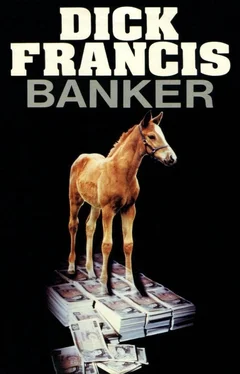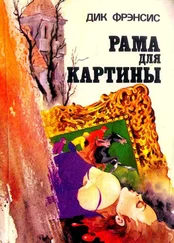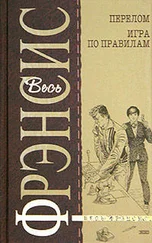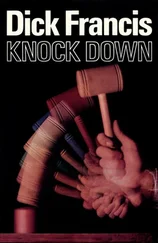‘Boxes for mares,’ he said, following my eyes. ‘Beyond them, the foaling boxes. Beyond those, the breeding pen, with the stallion boxes on the far side of that again. My stud groom’s bungalow and the lads’ hostel, those roofs you can see in the hollow, they’re just beyond the stallions.’ He paused. ‘Would you care perhaps to look round?’
‘Very much,’ I said.
‘Come along, then.’ He led the way to a door at the back of the house, collecting an overcoat and a black retriever from a mud room on the way. ‘Go on then, Squibs, old fellow,’ he said, fondly watching his dog squeeze ecstatically through the opening outside door. ‘Breath of fresh air won’t hurt you.’
We walked across to the stable arch with Squibs circling and zig-zagging nose-down to the gravel.
‘It’s our quietest time of year, of course,’ Oliver Knowles said. ‘We have our own mares here, of course, and quite a few at livery.’ He looked at my face to see if I understood and decided to explain anyway. ‘They belong to people who own broodmares but have nowhere of their own to keep them. They pay us to board them.’
I nodded.
‘Then we have the foals born to the mares this past spring and of course the three stallions. Total of seventy-eight at the moment.’
‘And next spring,’ I said, ‘the mares coming to your stallions will arrive?’
‘That’s right.’ He nodded. ‘They come here a month or five weeks before they’re due to give birth to the foals they are already carrying, so as to be near the stallion within the month following. They have to foal here, because the foals would be too delicate straight after birth to travel.’
‘And... how long do they stay here?’
‘About three months altogether, by which time we hope the mare is safely in foal again.’
‘There isn’t much pause then,’ I said. ‘Between... er... pregnancies?’
He glanced at me with civil amusement. ‘Mares come into use nine days after foaling, but normally we would think this a bit too soon for breeding. The oestrus — heat you would call it — lasts six days, then there’s an interval of fifteen days, then the mare comes into use again for six days, and this time we breed her. Mind you,’ he added, ‘Nature being what it is, this cycle doesn’t work to the minute. In some mares the oestrus will last only two days, in some as much as eleven. We try to have the mare covered two or three times while she’s in heat, for the best chance of getting her in foal. A great deal depends on the stud groom’s judgement, and I’ve a great chap just now, he has a great feel for mares, a sixth sense, you might say.’
He led me briskly across the first big oblong yard where long dark equine heads peered inquisitively from over half-open stable doors, and through a passage on the far side which led to a second yard of almost the same size but whose doors were fully shut.
‘None of these boxes is occupied at the moment,’ he said, waving a hand around. ‘We have to have the capacity, though, for when the mares come.’
Beyond the second yard lay a third, a good deal smaller and again with closed doors.
‘Foaling boxes,’ Oliver Knowles explained. ‘All empty now, of course.’
The black dog trotted ahead of us, knowing the way. Beyond the foaling boxes lay a wide path between two small paddocks of about half an acre each, and at the end of the path, to the left, rose a fair sized barn with a row of windows just below its roof.
‘Breeding shed,’ Oliver Knowles said economically, producing a heavy key ring from his trouser pocket and unlocking a door set into a large roll-aside entrance. He gestured to me to go in, and I found myself in a bare concrete-floored expanse surrounded by white walls topped with the high windows, through which the dying sun wanly shone.
‘During the season of course the floor in here is covered with peat,’ he said.
I nodded vaguely and thought of life being generated purposefully in that quiet place, and we returned prosaically to the outer world with Oliver Knowles locking the door again behind us.
Along another short path between two more small paddocks we came to another small stable yard, this time of only six boxes, with feed room, tack room, hay and peat storage alongside.
‘Stallions,’ Oliver Knowles said.
Three heads almost immediately appeared over the half-doors, three sets of dark liquid eyes turning inquisitively our way.
‘Rotaboy,’ my host said, walking to the first head and producing a carrot unexpectedly. The black mobile lips whiffled over the outstretched palm and sucked the goodie in: strong teeth crunched a few times and Rotaboy nudged Oliver Knowles for a second helping. Oliver Knowles produced another carrot, held it out as before, and briefly patted the horse’s neck.
‘He’ll be twenty next year,’ he said. ‘Getting old, eh, old fella?’
He walked along to the next box and repeated the carrot routine. ‘This one is Diarist, rising sixteen.’
By the third box he said, ‘This is Parakeet,’ and delivered the treats and the pat. ‘Parakeet turns twelve on January 1st.’
He stood a little away from the horse so that he could see all three heads at once and said, ‘Rotaboy has been an outstanding stallion and still is, but one can’t realistically expect more than another one or two seasons. Diarist is successful, with large numbers of winners among his progeny, but none of them absolutely top rank like those of Rotaboy. Parakeet hasn’t proved as successful as I’d hoped. He turns out to breed better stayers than sprinters, and the world is mad nowadays for very fast two-year-olds. Parakeet’s progeny tend to be better at three, four, five and six. Some of his first crops are now steeplechasing and jumping pretty well.’
‘Isn’t that good?’ I asked, frowning, since he spoke with no great joy.
‘I’ve had to reduce his fee,’ he said. ‘People won’t send their top flat-racing mares to a stallion who breeds jumpers.’
‘Oh.’
After a pause he said ‘You can see why I need new blood here. Rotaboy is old, Diarist is middle rank, Parakeet is unfashionable. I will soon have to replace Rotaboy, and I must be sure I replace him with something of at least equal quality. The prestige of a stud farm, quite apart from its income, depends on the drawing-power of its stallions.’
‘Yes,’ I said, I see.’
Rotaboy, Diarist and Parakeet lost interest in the conversation and hope in the matter of carrots, and one by one withdrew into the boxes. The black retriever trotted around smelling unimaginable scents and Oliver Knowles began to walk me back towards the house.
‘On the bigger stud farms,’ he said, ‘you’ll find stallions which are owned by syndicates.’
‘Forty shares?’ I suggested.
He gave me a brief smile. ‘That’s right. Stallions are owned by any number of people between one and forty. When I first acquired Rotaboy it was in partnership with five others. I bought two of them out — they needed the money — so now I own half. This means I have twenty nominations each year, and I have ‘no trouble in selling all of them, which is most satisfactory.’ He looked at me enquiringly to make sure I understood, which, thanks to Ursula Young, I did.
‘I own Diarist outright. He was as expensive in the first place as Rotaboy, and as he’s middle rank, so is the fee I can get for him. I don’t always succeed in filling his forty places, and when that occurs I breed him to my own mares, and sell the resulting foals as yearlings.’
Fascinated, I nodded again.
‘With Parakeet it’s much the same. For the last three years I haven’t been able to charge the fee I did to begin with, and if I fill his last places these days it’s with mares from people who prefer steeplechasing, and this is increasingly destructive of his flat-racing image.’
Читать дальше




